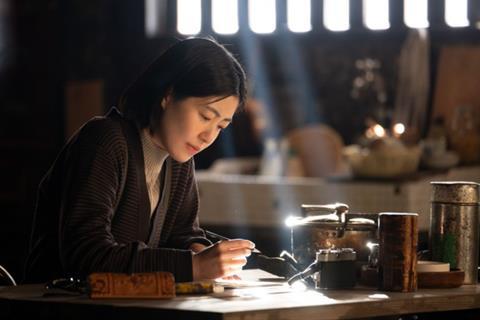A Korean writer searches for creative and romantic fulfilment in Japan

Dir: Sho Miyake. Japan. 2025. 89 mins
Sho Miyake’s latest gently poetic and reflexive drama nestles stories within stories but also, as its title suggests, performs several notable balancing acts. The writer/director employs opposites – water/snow, summer/winter, sunshine/darkness, heat/cold – in ways that give Two Seasons, Two Strangers a dynamic equilibrium.
Quietly elegant exploration of connection and storytelling
After winning admirers with his low-key sports film Small, Slow But Steady (2022), Miyake’s Golden Leopard triumph in Locarno is another victory for measured humanism. The accolade should help this quietly elegant exploration of connection and storytelling make its voice heard on the festival circuit and beyond.
Korean writer Li (Shim Eun-kyung) lives in Japan and, when we meet her, is looking for her own connection – that between her imagination and the right words to express it, her pencil on a page setting the scene for the film’s first act. There’s even a tension with words themselves, as we see Li’s inner thoughts reflected in Korean, though she is writing in Japanese.
In the story Li creates, a young woman, Nagisa (Yuumi Kawai) sparks up a fleeting and unexpected friendship with a young man, Natsuo (Mansaku Takada), at the Japanese seaside. Blue is the dominant colour, cropping up in everything from the costuming to a reference to blue lips when the pair, in one of the film’s many moments of balance or doubling, go swimming in the pouring rain. Their dip is captured with elemental fluidity by cinematographer Yuta Tsukinaga, whose textured work is a treat throughout.
Miyake repeatedly draws attention to the artifice of this first section, not least as we see it watched by an audience – “Honestly, I didn’t get it,” remarks one viewer – but as the film continues into its second tale, involving Li herself, naturalism is the more dominant note. While some patience is required, this is a film that gathers weight as it goes, and even those who don’t want to ruminate too much on Miyake’s metafiction scrutiny of the creative process will likely be reeled in by the character drama.
Li’s continued creative struggle, coupled with a catalyst event, send her looking for her own change of scene. It’s winter and, in a wooded village blanketed in snow, she finds herself renting a bed for the night from the curmudgeonly Benzo (Shinichi Tsutsumi), whose inn is literally off the map. Miyake has a feeling for snow, from the tiny flurries that drift in through the inn window to fluffy grey clouds of it that fall at night. Li and Benzo’s breath is visible inside his establishment but, in another indication of the film’s compelling contrasts, production designer Masato Nunobe’s use of browns and wood fills the place with unexpected warmth. There’s room for blues here, too, but they are mostly of a deeper kind than those of the first story; more cosy and less brittle.
The spare, lyrical scoring from Hi’Spec indicated a melancholic streak, as does lines of dialogue like “I think a good work is how it depicts human sadness.” Yet Miyake also offers warmth – a pink pig on a shelf, a pet rabbit’s name painted by a child’s hand or a hot bowl of noodles steaming up Li’s glasses on an ice cold day.
Cameras are also a repeated motif in Two Seasons, Two Strangers. Early on, a tourist on a beach makes Natsuo extremely uncomfortable as she tries to photograph him and, later, a camera from a friend has significance for Li. Perhaps unsurprisingly for someone whose life is spent working with the moving image, Miyake is less interested in capturing individual events than inviting us to contemplate the importance of intellectual and emotional travel and not getting yourself into a fixed spot – whether that’s writer’s block or within relationships.
Production companies: The Fool
International sales: Bitters End, international@bitters.co.jp
Producers: Masayoshi Johnai
Screenplay: Sho Miyake, based on Yoshiharu Tsuge’s manga ’Mr. Ben And His Igloo And A View of the Seaside’
Cinematography: Yuta Tsukinaga
Production design: Masato Nunobe
Editing: Keiko Okawa
Music: Hi’Spec
Main cast: Eun Kyung Shim, Yuumi Kawai, Mansaku Takada, Shiro Sano, Shinichi Tsutsumi

























No comments yet